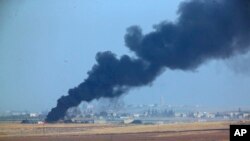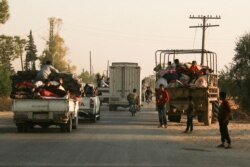As Turkish forces began a military operation in the north of Syria, Kurdish SDF leaders scrambled for possible support from the Syrian government in Damascus to help fend off a full-blown Turkish invasion. Kurdish leaders also called on Russia to act as an intermediary in possible talks with Damascus.
Rami Abdel Rahman of the Syrian Observatory for Human Rights told Arab media that Turkish planes had conducted at least four airstrikes on the town of Ras al- Ayn and that many civilians were fleeing the region for safer areas. Turkish forces, he added, also were shelling the town of Tal al Abyad with long-range artillery.
Amateur video on social media showed Kurds in a number of towns across northern Syria protesting the Turkish attack, and other videos claimed to show Kurds rushing to join military units to fend off what they feared was an impending Turkish invasion.
A Kurdish SDF military commander told a gathering of the group's militiamen that he was declaring a region-wide call-up of all those able to fight. He also said there is proof that Turkey has helped the Islamic State terrorist group dozens of times with weapons, safe-passage and other tactical support in various parts of northern Syria.
In a tweet Tuesday, the commander alluded to a possible SDF alliance with Syrian government forces. Saudi-owned al Arabiya TV reported Wednesday that Kurdish leaders in northern Syria were calling on Russia to act as an intermediary in a possible rapprochement between the SDF and Damascus, following the decision by U.S. President Donald Trump to withdraw some forces from the region.
Mohammed Kheir Akkam, a member of the Syrian parliament, told Arab media that Damascus "could come to the aid of the Kurds, but on the condition that they expressed their loyalty to the government, rather than other outside forces," alluding to the U.S.
Joshua Landis, who heads the Middle East department at the University of Oklahoma tells VOA that he "doubts the US government will allow the Syrian military to move north of the Euphrates River even if its YPG (Kurdish allies) ask for this." "The US," he says, "is an ally of Turkey and an enemy of (Syrian President Bashar al) Assad and Iran."
However, Hilal Khashan, who teaches political science at the American University of Beirut, told VOA that he doubts such an alliance would occur.
"The Syrian Army moved into [the northern Aleppo border town of] Afrin last year, but pulled out immediately after the Turkish Army closed in," he said. "In the unlikely event that they cooperate, their combined forces are no match for Turkey's."



